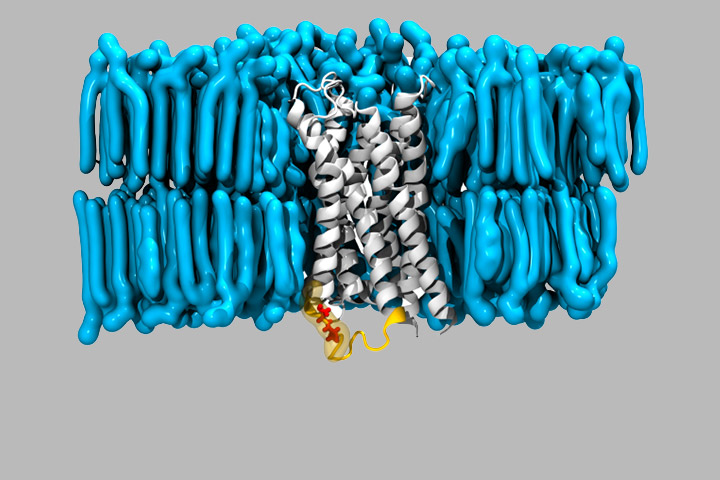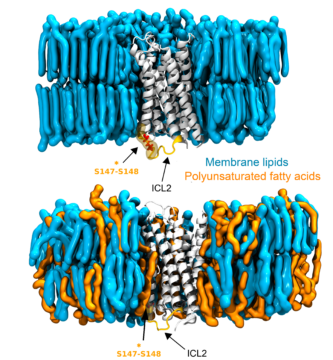
Marie-Lise Jobin, Pierre Trifilieff et al in Mol Psychiatry
A growing body of evidence supports a relationship between the metabolism of polyunsaturated fatty acids (PUFAs) lipid species and mental health. In particular, a decrease in n-3 PUFA levels has been described in several psychiatric disorders. In a study published in Molecular Psychiatry, Jobin et al. elucidate the key role that PUFAs play on one of the dopamine receptors, which is a main target of several pharmacological treatments.

Cell membranes are not homogeneous bilayers of lipids, but rather composed of different lipid species that notably modulate the localization and interaction of proteins within the cell and therefore their functions. Studies on the role of such membrane complexity – in particular the heterogeneity of lipids across tissues, cell types and subcellular compartments – on cell signaling and physiology are only beginning to emerge. In particular, the impact of membrane lipid composition has long been neglected in the study of neuronal functions, while the brain is the second organ containing the most lipids after adipose tissue. Recent findings point to a direct association between brain PUFA levels and dopamine signaling, a major neurotransmitter implicated in many psychiatric symptoms. However, the intimate mechanisms of this relationship are unknown.
In a study ranging from in vivo experiments to analyses at the molecular/atomic scale, French researchers from CNRS and INRAE, in collaboration with Swiss, American and Spanish groups, investigated the impact of membrane PUFA composition on the activity of the dopamine D2 receptor (D2R). They demonstrate that membrane enrichment in docosahexaenoic acid (DHA) – the most abundant n-3 PUFA in the brain – promotes the binding of dopamine to the D2R, but also of exogenous ligands including certain antipsychotics. DHA therefore acts as an allosteric modulator of D2R activity. Molecular dynamics simulations confirm that membrane DHA has a strong preference for interaction with the D2R and that its presence selectively impacts the conformational dynamics of the receptor around its second intracellular loop (see Figure), a key element in the activation of signaling pathways that use β-arrestin. Furthermore, the results of this study show that membrane enrichment in PUFAs does not alter the canonical G protein-dependent signaling pathway but specifically promotes recruitment of β-arrestin. Interestingly, this signaling pathway is suspected to be particularly important for the beneficial effects of new generation antipsychotics. Strikingly, DHA deficiency in vivo in mice attenuates the behavioral effects of one of these molecules, aripiprazole.
These results, published in the journal Molecular Psychiatry, highlight the importance of membrane lipid unsaturation for D2R activity and suggest a mechanism by which PUFAs could improve the efficacy of certain antipsychotics.
Reference
Impact of membrane lipid polyunsaturation on dopamine D2 receptor ligand binding and signalling
M.-L. Jobin, V. De Smedt-Peyrusse, F. Ducrocq, R. Baccouch, A. Oummadi, M. Hauge Pedersen, B. Medel-Lacruz, M.-F. Angelo, S. Villette, P. Van Delft, L. Fouillen, S. Mongrand, J. Selent, T. Tolentino-Cortez, G. Barreda-Gómez, S. Grégoire, E. Masson, T. Durroux, J. A. Javitch, R. Guixà-González, I. D. Alves & P. Trifilieff
Mol Psychiatry 2023.
https://doi.org/10.1038/s41380-022-01928-6
Main authors




Last update 16/02/23
